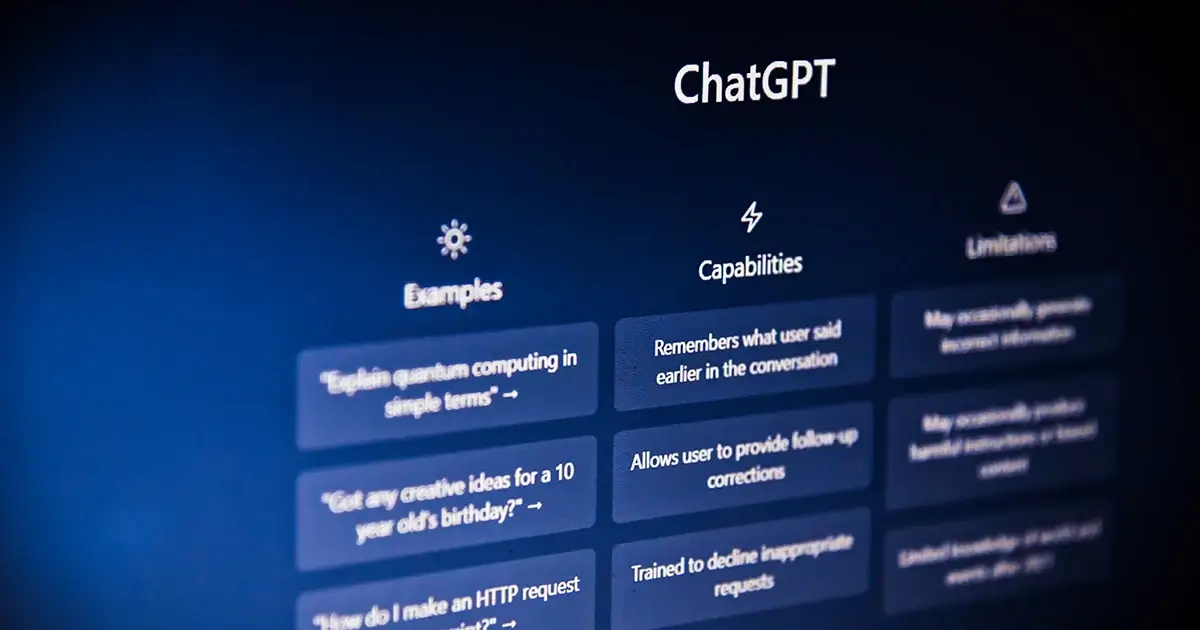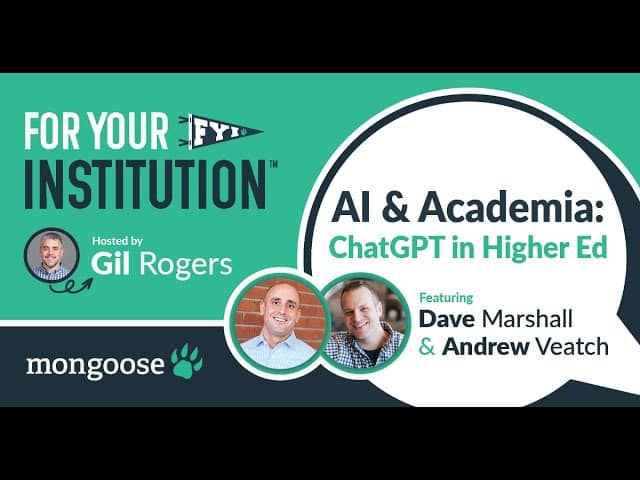AI & Academia: How ChatGPT is Shaping Higher Education

Discussing one of the most talked about topics in tech, ChatGPT, two of Mongoose’s fearless leaders, Dave Marshall and Andrew Veatch, join FYI host with the most, Gil Rogers, to highlight what exactly ChatGPT is, as well as what it means not just for the tech industry but the role it can have in higher education moving forward.
Who is Gil Rogers?
Gil brings more than two decades of higher education experience to guide our guests into sharing their expertise.
When he’s not playing FYI host or ed-tech marketing guru, you can find him on the bench coaching his son’s youth hockey and baseball teams or exploring the North Woods of Maine with his wife, kids, and dog, Buttercup.
Who are Dave and Andrew?
Dave Marshall, is the founder, CEO and employee number one here at Mongoose. Andrew Veatch is the Vice President of Technology and is employee number two. Mongoose OGs, if you will.
When not working you can find Dave raising his three boys which he says “keeps me active and on my toes.” Andrew can be found hiking around Western New York, cooking, and working on their old house with his wife and daughters. Both are coffee aficionados as well as super dads.
What is ChatGPT?
In this episode, Dave and Andrew walk us through what ChatGPT is and how it works.
Andrew breaks down the “GPT” part first: “It’s an artificial intelligence model that stands for Generative Pre-trained Transformer. It’s a large language model which comprises a massive amount of text that it’s been trained on.”
Andrew adds, “It’s a neural network and is modeled to mimic the human brain. It functions on a number of connections between different pieces of information the same way the neurons in our brain do. This GPT has been trained using essentially everything on the internet.”
The GPT component has been around for a while, but it wasn’t until a chatbot was put alongside it that it really gained traction.
“We’re all very comfortable with chatbots we love interacting with them. It’s very natural. It’s being able to have all that a human conversation with this incredibly powerful model behind it,” he says.
Will it replace people?
All three agree that, in short, no, it won’t be replacing people and certain jobs. But, they do think it’s going to complement and amplify many aspects of jobs and tools we already use.
Gil adds that ChatGPT is going to be “another skill to put on your resume as a bullet, just like I know how to use Word, Powerpoint, Java.”
Andrew believes there’s definitely a skill set to using ChatGPT to have it be as efficient for you as possible.
“If you are good at giving prompts to the tool, giving context, giving it information to go with it, you will get a much more well-shaped response that’s more helpful to you.”
Aging himself and listeners, Andrew adds that you’ll see more tools add a ChatGPT integration, “Think of it as like, if you remember, Clippy. This is Clippy on steroids.”
Thankfully we haven’t reached Skynet levels of sophistication – yet.
What does ChatGPT mean for higher education?
When discussing the impact that ChatGPT may have on the higher education industry, Dave says that while the day-to-day lives of staff may not change significantly in the short term, it’s still important for institutions to “embrace it as just another tool in the toolbox to help students learn and create things.”
Dave goes on to say that in the long-term, software like Mongoose platform or other messaging platforms that are used alongside ChatGPT could use known information about the student to recommend certain messaging and save a huge amount of staff time.
“It’s an extremely profound change in how humans learn and how quickly they can learn,” Dave says. “This is a second-year student, this is their major, and other pieces of information we have on them… the responses could be hyper-tailored to them.”
Dave adds that we aren’t at the point where we’d want conversations to be done automatically by ChatGPT without human approval, but that it would then create higher efficiency and allow staff to spend more time doing things that only humans can do.
Hear the entire conversation and more about what ChatGPT means for higher education below.




